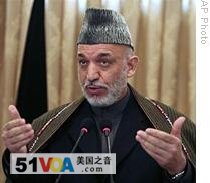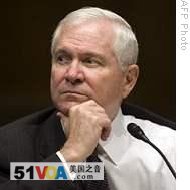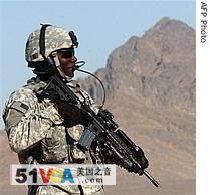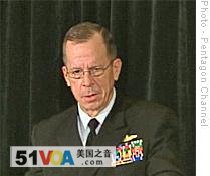Pentagon
16 April 2009
 |
| Afghan President Hamid Karzai (file photo) |
U.S. defense officials have been focused on the civilian casualty issue for a long time. But they say it is difficult to prevent all civilian casualties because insurgents often hide among civilians and sometimes try to deceive coalition forces into firing on them.
In addition, the shortage of coalition troops in Afghanistan has caused a higher reliance on air strikes, which are more likely to cause what the military calls "collateral damage."
That was the case in the most recent incident. NATO says six civilians died in an air strike on Monday in Kunar Province in eastern Afghanistan.
 |
| US Defense Secretary Robert Gates (file photo) |
"General McKiernan has taken some significant steps in terms of changing the way we go about our operations in Afghanistan, including by the Special Forces, to try and take even further measures to avoid civilian casualties and to avoid antagonizing the local population. This is something I worry about a lot. If we lose the Afghan people, we have lost the war," he said.
Secretary Gates also called for better cooperation between military units in Afghanistan and the joint civilian-military Provincial Reconstruction Teams. He acknowledged that when military operations kill civilians or destroy local facilities, they hurt the effort to improve the lives of local people and earn their trust and support.
"I am very concerned [about] how do we keep the Afghan people on our side by helping them understand that we are on their side? And so one of the things that I have talked to General McKiernan about, and that he is taking very seriously, is how do we partner on virtually all of these operations so that if somebody's knocking down the door, it is an Afghan knocking down the door, not an American, or not a German or somebody else? And I think we have made a lot of strides in that," said Gates.
 |
| US soldier with NATO-led International Security Assistance Force (ISAF) patrols Farah province (file photo) |
But that will take years. In the meantime, the United States is increasing its troop presence in Afghanistan this year by about 50 percent, and other coalition countries are making smaller increases.
The top U.S. military officer, Admiral Mike Mullen, told ABC television's Good Morning America program this week that the goal is for foreign forces to provide better security for Afghans in the short term and to train Afghan troops to do as much of the job as quickly as possible.
 |
| Admiral Mike Mullen, 31 Mar 2009 |
The increase in troops will also mean more ground operations and possibly fewer air strikes - the kind of attack that most often causes civilian casualties.